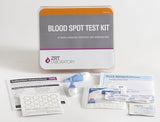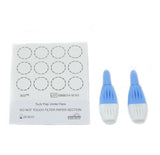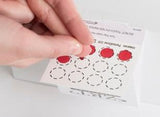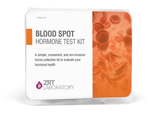The Progesterone Test (Pg) is a comprehensive test designed to measure progesterone hormone levels effectively in the blood. It is particularly useful in identifying any hidden progesterone imbalances, whether in deficiency or excessive form, that are often correlated with symptoms of menopause. The test kit is equipped to identify these imbalances precisely and is best used in conjunction with Estradiol (Estrogen) testing, as an imbalance of these two hormones is associated with major symptoms of menopause and reproductive system disorders. (see Progesterone and Estradiol Profile).
Key Features of the Progesterone Hormone Test Kit:
- Accurate Measurement: The test kit effectively measures progesterone hormone levels in the blood, providing precise identification of any hidden imbalances.
- Detection of Progesterone Imbalances: The test detects both deficiency and excessive levels of progesterone, which are often associated with symptoms of menopause and reproductive system disorders.
- Comprehensive Hormone Profile: Progesterone is best tested in conjunction with Estradiol (Estrogen) to evaluate the balance between these two hormones, as imbalances can contribute to menopausal symptoms.
- Convenient Home Sampling: The test kit allows you to collect your blood sample from the comfort of your home, eliminating the need for a laboratory appointment.
- Suitable for Adults and Children: The test kit is suitable for both adults and children, making it a versatile option for individuals of all ages.
- Suitable for Men and Women: Regardless of gender, the test kit can be used by both men and women to assess progesterone hormone levels.
- Timely Results: After the laboratory receives your sample, you can expect to receive your test result within 3-5 working days via email.
- Clear Test Result Format: The test result provides hormone-level information in graphics and numbers, allowing for easy interpretation and understanding.
- Expert Analysis: The test result includes comments from a Hormone Specialist PhD, who provides an analysis of your hormone levels and offers guidance on the next steps.
- Infertility Diagnosis: Progesterone measurements can help diagnose infertility problems by determining if and when a woman has ovulated.
- Test Validity: It is important to utilize the test within 12 months from the date of purchase to ensure accurate results.
- Inclusive Laboratory Fee: The test kit covers the laboratory fee, eliminating the need for any additional costs or taxes associated with the analysis.
- Customer Shipping Responsibility: After collecting your samples using the provided materials in the test kit, it is your responsibility to ship the samples to our laboratory. This requirement ensures that the samples reach the laboratory in a timely manner for analysis. You have the flexibility to choose the shipping method that suits your convenience and location. While you may need to cover the shipping costs, this arrangement allows you to have control over the shipping process and helps ensure the prompt delivery of your samples for accurate analysis.
- The freshness of Samples: The freshness of the dried blood spot sample is crucial for accurate hormone level analysis. When using our test kit, you can be assured that your sample will remain fresh for up to 45 days. The shipping time from your location to our laboratory plays a significant role in maintaining sample freshness. If you choose to utilize the post office service, it typically takes between 3 to 5 working days for your sample to reach our lab. Alternatively, if you opt for private carriers, the delivery time can be expedited to within 48 hours. This ensures that your sample arrives promptly, preserving its freshness and integrity for precise hormone-level testing.
Test Kit Includes Following Components:
The test kit comprises several essential components to facilitate the sample collection and return process. These components are carefully included to ensure a smooth and accurate testing experience. The test kit includes:
- Sample collection card: This card is specifically designed for the collection of the required sample. It is sterile and suitable for preserving the integrity of the sample during transportation.
- Two lancets: The kit includes two lancets, which are small, sterile instruments used to safely and effectively puncture the skin for blood collection. These lancets are designed to minimize discomfort during the collection process.
- Sample collection instructions: Clear and detailed instructions are provided to guide users through the process of collecting the sample accurately. These instructions ensure that the collection is performed correctly and in accordance with the testing requirements.
- Test requisition form: This form contains important information that needs to be filled out by the user. It typically includes personal details, such as name and contact information, a list of symptoms as well as any additional information required for testing purposes.
- Return envelope: A pre-addressed return envelope is included in the kit. It is specifically provided for the convenient and secure return of the collected sample to the testing facility. Users can simply seal the envelope with the sample inside and mail it back following the provided instructions.
- Shipping Instructions: The kit also includes detailed instructions on how to properly package and ship the collected sample back to the testing facility. These instructions ensure that the sample remains protected and arrives safely for analysis.
By including these components in the test kit, the aim is to streamline the sample collection and return process, allowing users to perform the test easily and efficiently while maintaining the integrity of the sample.
Progesterone Imbalance: Symptoms of Deficiency in Men and Women
Progesterone is a hormone that plays a crucial role in the reproductive system and overall hormonal balance in both men and women. When there is a deficiency or imbalance of progesterone, it can lead to various symptoms that affect the body and mind. Here are the detailed symptoms of progesterone deficiency in men and women:
- Decreased fertility: Progesterone is essential for regulating the menstrual cycle in women and supporting pregnancy. Insufficient levels of progesterone can disrupt ovulation and decrease fertility.
- Heavy or painful periods: In women, low progesterone levels can contribute to heavy or prolonged menstrual bleeding, accompanied by severe abdominal cramps and discomfort.
- Irregular periods: Progesterone deficiency can cause irregular menstrual cycles, with variations in the length and timing of periods. Women may experience missed periods or a lack of predictability in their menstrual cycle.
- Mood swings: Hormonal imbalances, including low progesterone, can trigger mood swings, leading to emotional instability, irritability, and heightened sensitivity to stressors.
- Hot flashes: Both men and women may experience hot flashes due to low progesterone levels. These sudden episodes of intense heat can cause flushing, sweating, and a rapid heartbeat.
- Tender or fibrocystic breasts: In women, progesterone deficiency can result in breast tenderness, swelling, or the development of fibrocystic breast tissue, causing discomfort and pain.
- Urinary incontinence: Progesterone plays a role in maintaining the strength and elasticity of the pelvic floor muscles. Insufficient progesterone levels can lead to weakened pelvic muscles, causing urinary incontinence or leakage.
- Vaginal dryness: Progesterone helps keep the vaginal tissues lubricated and healthy. A deficiency can lead to vaginal dryness, itching, and discomfort during intercourse.
- Backache: Lower back pain and discomfort may occur as a result of hormonal imbalances, including progesterone deficiency.
- Bloating: Progesterone influences fluid balance in the body, and its deficiency can lead to water retention, bloating, and a sensation of abdominal fullness.
- Bone loss: Progesterone plays a crucial role in maintaining bone density. Inadequate progesterone levels can contribute to accelerated bone loss, increasing the risk of osteoporosis and fractures.
- Irritability: Progesterone deficiency can cause irritability and a decreased tolerance for stress, leading to mood disturbances and difficulty in managing emotions.
- Loss of muscle mass: In men, insufficient progesterone levels may contribute to a decline in muscle mass and strength, resulting in muscle weakness and reduced physical performance.
- Low libido: Progesterone plays a role in maintaining sexual desire and arousal in both men and women. Deficiency can lead to a decreased libido or a loss of interest in sexual activity.
- Memory lapses: Progesterone influences brain function and cognitive processes. When levels are low, individuals may experience memory lapses, difficulties with concentration, and mental fog.
- Nervousness: Progesterone deficiency can cause feelings of restlessness, nervousness, and anxiety, impacting overall emotional well-being.
- Poor concentration: Inadequate progesterone levels may affect focus, attention span, and cognitive abilities, leading to difficulties in concentration and mental clarity.
- Sleep disturbances: Progesterone plays a role in promoting quality sleep. Its deficiency can contribute to insomnia, disrupted sleep patterns, and restless nights.
-
Weight gain: Hormonal imbalances, including low progesterone, can affect metabolism and lead to weight gain, particularly in the abdominal area.
- Nausea and vomiting: Progesterone deficiency may cause nausea and, in some cases, vomiting, which can impact overall digestion and well-being.
- Depression: Fluctuations in progesterone levels can influence mood and contribute to feelings of sadness, hopelessness, and depression.
Benefits of Using the Progesterone Hormone Test Kit:
- Early Detection of Hormonal Imbalances: By identifying progesterone imbalances, the test helps detect potential issues affecting reproductive health early on.
- Personalized Treatment Approach: The test results provide valuable insights for healthcare professionals to tailor treatment plans according to your specific hormone levels, optimizing effectiveness.
- Convenience and Privacy: Collecting the sample at home ensures convenience and privacy, avoiding the need for laboratory visits or discussions in a clinical setting.
- Cost-Effective Option: The test kit includes a laboratory fee, eliminating the need for additional costs or taxes associated with the analysis.
- Medication Administration Optimization: The highly reliable results of the test help in adjusting the administration of medication, ensuring appropriate dosing and minimizing potential risks.
- Comprehensive Symptom Understanding: By linking progesterone imbalances to a wide range of symptoms, the test kit enhances your understanding of the potential underlying causes of various physical and emotional changes.
- Monitoring Hormonal Changes: Regular testing using the kit allows for the monitoring of progesterone levels over time, enabling better management of reproductive health.
- Empowerment through Knowledge: Knowing your progesterone hormone levels empowers you to take control of your health and make informed decisions about lifestyle changes and potential treatments.
- Reduced Waiting Time: With the test kit, there is no need to wait for a laboratory appointment, resulting in faster access to crucial hormone-level information.
- Comprehensive Hormone Assessment: Combining the Progesterone and Estradiol (Estrogen) tests provides a comprehensive evaluation of hormonal balance, offering a more complete understanding of reproductive health.
- The progesterone Hormone Test is best tested together with Estradiol (Estrogen) (see Progesterone and Estradiol Profile).
Further Reading
What is Progesterone Hormone?
Progesterone is a vital hormone that plays a significant role in the female reproductive system, particularly during pregnancy and the menstrual cycle. It is produced primarily in the ovaries by the corpus luteum, a temporary endocrine gland that forms after ovulation. However, progesterone is also produced in smaller amounts by the adrenal glands.
Progesterone is classified as a steroid hormone and belongs to a group called progestogens. It works in conjunction with estrogen to regulate various physiological processes in the body. Its main functions include preparing the uterus for pregnancy, maintaining pregnancy, and regulating the menstrual cycle.
During the menstrual cycle, progesterone levels rise after ovulation, preparing the uterus for the potential implantation of a fertilized egg. If pregnancy does not occur, progesterone levels decline, leading to the shedding of the uterine lining and the onset of menstruation.
If pregnancy occurs, progesterone continues to be produced in higher amounts, providing crucial support for the developing embryo and maintaining the pregnancy. It helps to thicken the uterine lining, prevent contractions that could lead to miscarriage, and support the growth and development of the placenta.
Progesterone also has various effects on other organs and tissues in the body. It helps regulate the menstrual cycle by interacting with estrogen to balance the growth and shedding of the uterine lining. Additionally, progesterone affects breast tissue, preparing it for potential milk production during pregnancy.
Apart from its reproductive functions, progesterone influences other systems in the body. It has effects on the central nervous system, potentially impacting mood, sleep, and cognition. Progesterone also affects bone health by aiding in the maintenance of bone density.
In men, progesterone is present in smaller quantities and is involved in the production of testosterone and other male hormones.
Overall, progesterone plays a crucial role in the female reproductive system, pregnancy, and hormonal balance. Its levels fluctuate throughout the menstrual cycle and during different stages of a woman's life. Maintaining optimal progesterone levels is essential for reproductive health, fertility, and overall well-being.
What is the function of the Progesterone Hormone?
Progesterone is a hormone that is primarily produced in the ovaries in women and in smaller amounts in the adrenal glands in both men and women. It plays a crucial role in the female reproductive system and has various important functions in the body.
- Menstrual cycle regulation: Progesterone works in conjunction with estrogen to regulate the menstrual cycle in women. It helps prepare the uterus for pregnancy by thickening the lining of the uterus (endometrium) during the second half of the menstrual cycle. If fertilization occurs, progesterone helps maintain the pregnancy by supporting the development and growth of the embryo.
- Pregnancy support: During pregnancy, the placenta produces progesterone, which is essential for maintaining a healthy pregnancy. Progesterone helps relax the muscles of the uterus, preventing contractions that could lead to premature labour. It also supports the growth of the mammary glands in preparation for breastfeeding.
- Breast development and milk production: Progesterone influences breast tissue development, especially during puberty and pregnancy. It helps stimulate the growth of milk-producing glands in the breast and prepares the breasts for lactation.
- Mood regulation: Progesterone has an impact on brain function and can influence mood and emotions. It helps promote a sense of calmness and relaxation and has a soothing effect on the central nervous system. Progesterone also interacts with neurotransmitters in the brain, such as gamma-aminobutyric acid (GABA), which has a calming effect.
- Bone health: Progesterone plays a role in maintaining healthy bones. It works in tandem with estrogen to regulate bone turnover and prevent excessive bone loss. Progesterone helps stimulate the activity of osteoblasts, the cells responsible for bone formation.
- Libido and sexual function: Progesterone contributes to sexual desire and arousal in both men and women. It helps maintain healthy vaginal tissues and lubrication, promoting comfortable sexual intercourse.
- Regulation of fluid balance: Progesterone influences fluid balance in the body. It helps prevent water retention and bloating by counteracting the effects of other hormones, such as aldosterone.
It is important to note that progesterone's functions are not limited to the ones mentioned above and can vary depending on the individual's sex and physiological state. Progesterone levels fluctuate throughout the menstrual cycle, with peak levels occurring during the luteal phase (the second half of the cycle) and dropping if pregnancy does not occur, leading to menstruation.
How to Use












